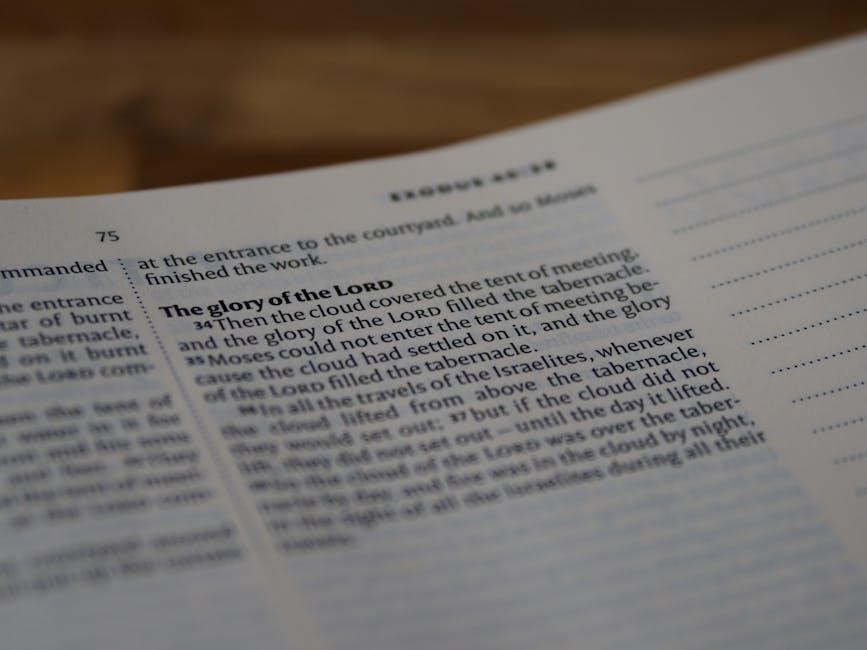The Bible, written by approximately 40 authors over 1,500 years, is a unified text despite its diverse contributors. These authors, inspired by God, included kings, prophets, poets, and fishermen, each bringing unique perspectives to the sacred text, shaping its cultural and spiritual impact across centuries.
Overview of the Bible’s Authorship
The Bible was written by approximately 40 authors over a span of 1,500 years, with the Old Testament attributed to 30 authors and the New Testament to 8. These writers, divinely inspired, represented diverse backgrounds, including kings, prophets, poets, and fishermen. Moses authored the first five books, while Paul contributed significantly to the New Testament. Despite the vast time frame and varied occupations, the Bible’s unity and coherence stand as a testament to a single, overarching divine inspiration. This diverse authorship highlights God’s ability to use ordinary people to convey extraordinary truths, ensuring the Bible’s relevance and authority across generations.

Historical Context of Biblical Writing
The historical context of biblical writing spans numerous eras, from the patriarchal period to the Roman Empire. The Old Testament’s composition began with Moses around 1446 BC, while the New Testament concluded with John’s Revelation near 100 AD. Authors wrote in diverse settings—Moses in the wilderness, David as a king, and Paul under Roman imprisonment. Cultural influences, such as Hebrew traditions and Greek philosophy, shaped their narratives. Despite these varied contexts, the writings maintain theological consistency, reflecting God’s ongoing interaction with humanity. This historical tapestry enriches the Bible’s depth, providing a chronological and cultural framework for understanding its message and enduring relevance across millennia.

Old Testament Authors
The Old Testament features 30 authors, including Moses, Joshua, Samuel, David, Solomon, Isaiah, Jeremiah, Ezekiel, and Daniel. Their writings span diverse roles and historical periods.
Moses: Author of the Pentateuch
Moses is traditionally credited with writing the Pentateuch, the first five books of the Bible: Genesis, Exodus, Leviticus, Numbers, and Deuteronomy. These texts form the foundation of Jewish and Christian scripture, detailing creation, the early history of humanity, and the Israelites’ deliverance from Egypt. Moses, a prophet and leader, received divine revelation, including the Ten Commandments, shaping the moral and legal framework of the Israelites. His writings also include instructions for worship and governance, reflecting his dual role as a spiritual and political leader. Moses’ authorship is widely accepted, though some scholars debate the extent of his direct involvement, suggesting later edits by others. Nonetheless, his influence on the Bible’s beginnings remains unparalleled.
Joshua: Author of the Book of Joshua
Joshua, a prominent leader and successor to Moses, is traditionally credited with authoring the Book of Joshua. This book chronicles the Israelites’ conquest of Canaan, fulfilling God’s promise of a homeland. It details key events such as the fall of Jericho and the distribution of land among the tribes. While Joshua is the primary author, some scholars suggest that the final verses, particularly Joshua’s death and burial, may have been added by Eleazar or Phinehas, as noted in the Talmud. The book emphasizes God’s faithfulness and Joshua’s obedience, serving as a bridge between the Pentateuch and the rest of the Old Testament. Its narrative highlights divine guidance and the establishment of Israel as a nation.
Samuel: Author of Judges and Ruth
Samuel, a prophet and judge of Israel, is traditionally associated with the authorship of the Books of Judges and Ruth. While he may not have written the entire Book of Judges, his influence is evident, particularly in the latter chapters. The Book of Judges recounts Israel’s cyclical pattern of sin, judgment, and deliverance through various judges, highlighting God’s faithfulness despite human rebellion. The Book of Ruth, often seen as an appendix to Judges, narrates the story of Ruth, a Moabite woman, emphasizing loyalty, redemption, and God’s providence. Samuel’s role in transitioning Israel from the judges to the monarchy underscores his significance. These books reflect theological themes of covenant, faith, and divine sovereignty, bridging the historical gap between the conquest of Canaan and the rise of kingship in Israel.
David: Author of Psalms
King David, known as the “sweet psalmist of Israel,” is the primary author of the Psalms, contributing approximately 73 of the 150 psalms. His writings reflect a deep emotional and spiritual connection with God, capturing moments of joy, sorrow, repentance, and trust. Many psalms are rooted in David’s personal experiences, such as his victories, struggles, and divine encounters, making them timeless expressions of human spirituality. The Psalms also include contributions from other authors like Asaph, the sons of Korah, and Solomon. David’s authorship is a testament to his role as a spiritual leader and poet, bridging the gap between personal devotion and communal worship. His psalms remain central to Jewish and Christian liturgy, offering comfort, guidance, and praise to believers across generations.
Solomon: Author of Proverbs, Ecclesiastes, and Song of Solomon
Solomon, the third king of Israel, is renowned for his wisdom and literary contributions to the Bible. He authored three books: Proverbs, Ecclesiastes, and the Song of Solomon. Proverbs offers practical wisdom on ethical living, while Ecclesiastes reflects on the meaning of life and the fleeting nature of earthly pursuits. The Song of Solomon is a poetic exploration of love and relationships. Solomon’s writings are deeply philosophical and reflective, showcasing his divine wisdom. His works emphasize the importance of fearing God and living a virtuous life. Despite his later life struggles, Solomon’s literary legacy remains a cornerstone of biblical wisdom, guiding readers in their spiritual and moral journeys.
Isaiah: Author of the Book of Isaiah
Isaiah, a prominent prophet in the Old Testament, authored the Book of Isaiah, a comprehensive and deeply spiritual text. His ministry spanned over 40 years, serving under multiple kings of Judah. The book contains prophecies of judgment, calls to repentance, and visions of a messianic future. Isaiah’s writings emphasize God’s holiness, justice, and redemption, offering hope to Israel and beyond. His prophecies about a suffering servant and the coming Messiah are foundational to Christian theology. Isaiah’s poetic and visionary style, combined with his theological depth, make his book one of the most influential in the Bible. His work continues to inspire and guide believers, underscoring God’s sovereignty and love for humanity.
Jeremiah: Author of Jeremiah and Lamentations
Jeremiah, a major prophet of the Old Testament, authored the Book of Jeremiah and the poetic collection of Lamentations. His ministry spanned over 40 years during a time of significant turmoil in Judah, as the nation faced invasion, exile, and spiritual decay. Jeremiah’s prophecies focused on calls to repentance, warnings of judgment, and promises of restoration. His message emphasized God’s faithfulness and the need for covenant obedience. Lamentations, traditionally attributed to him, reflects on the fall of Jerusalem with deep sorrow and hope. Jeremiah’s writings are known for their emotional depth and theological richness, offering insights into God’s justice, mercy, and redemptive plan. His influence remains profound in both Jewish and Christian traditions, shaping theological understanding and spiritual reflection.
Ezekiel: Author of the Book of Ezekiel
Ezekiel, a prophet and priest, authored the Book of Ezekiel, which contains vivid visions and prophecies. Exiled in Babylon during the 6th century BCE, Ezekiel’s ministry addressed the crises of Jerusalem’s fall and the Jewish diaspora. His prophetic messages emphasized divine judgment, covenant faithfulness, and future restoration. Ezekiel’s unique style includes symbolic acts and apocalyptic imagery, such as the vision of the wheels and the valley of dry bones, which symbolize God’s sovereignty and hope for Israel’s revival. His writings blend theological depth with dramatic imagery, offering insights into God’s justice and mercy. Ezekiel’s legacy endures as a powerful voice of both warning and comfort, shaping Jewish and Christian understanding of God’s redemptive plan.
Daniel: Author of the Book of Daniel
Daniel, a prophet and statesman, authored the Book of Daniel during the 6th century BCE. Exiled in Babylon, Daniel served as a royal advisor, interpreting dreams and visions for King Nebuchadnezzar. His book contains apocalyptic prophecies, including the famous visions of the four beasts and the 70 weeks, which foretell future events and the ultimate triumph of God’s kingdom. Stories like Daniel in the lions’ den and the three Hebrews in the fiery furnace highlight his unwavering faith and divine favor. Daniel’s writings emphasize trust in God’s sovereignty, even in exile, and offer hope for Israel’s restoration. His unique blend of prophecy and historical narrative has made his book a cornerstone of biblical eschatology and a testament to enduring faith amidst adversity.

New Testament Authors
The New Testament was written by 8 key authors, including Matthew, Mark, Luke, John, Paul, James, Peter, and Jude. These apostles, fishermen, tax collectors, and scholars collectively shared the life of Christ and the early church’s teachings, forming the foundation of Christianity.

Matthew: Author of the Gospel of Matthew
Matthew, a former tax collector and one of Jesus’ twelve apostles, is traditionally credited with writing the Gospel of Matthew. His background in taxation suggests he was well-educated and familiar with Jewish and Roman cultures. Matthew’s Gospel emphasizes Jesus as the Messiah, fulfilling Old Testament prophecies, and is known for its structured, thematic approach. He often addresses a Jewish audience, highlighting connections between Jesus’ life and Jewish scripture. Matthew’s unique contributions include the Sermon on the Mount, the Great Commission, and detailed accounts of Jesus’ miracles and teachings. His writing bridges the Old and New Testaments, showcasing Jesus as the fulfillment of God’s promises to Israel.
Mark: Author of the Gospel of Mark
Mark, traditionally believed to be the author of the Gospel of Mark, is closely associated with Peter, one of Jesus’ apostles. His Gospel, the shortest among the synoptic Gospels, is known for its fast-paced narrative, focusing on Jesus’ actions and miracles rather than lengthy teachings. Mark emphasizes Jesus’ divine power and compassion, often using action verbs to convey His ministry. The Gospel of Mark is thought to have been written for early Christian communities, possibly Gentile audiences, highlighting themes of faith, service, and the messianic identity of Jesus. Mark’s account includes unique sections, such as the abrupt ending in some manuscripts, which has sparked theological and scholarly discussions. His work provides a dynamic and vivid portrayal of Jesus’ life and mission.

Luke: Author of the Gospel of Luke and Acts
Luke, a Gentile and companion of the Apostle Paul, is traditionally credited with writing the Gospel of Luke and the Acts of the Apostles. His Gospel emphasizes Jesus’ compassion, universal message, and the inclusion of marginalized groups, reflecting Luke’s concern for social justice. The book of Acts chronicles the early Christian church and the spread of Christianity, highlighting the role of the Holy Spirit and key figures like Peter and Paul. Luke’s writings are known for their meticulous research and orderly presentation, addressing Theophilus and other Gentile audiences. His work bridges the life of Jesus with the growth of the church, providing a theological and historical link between the Gospels and the epistles, making his contributions invaluable to understanding the New Testament narrative.
John: Author of the Gospel of John, 1-3 John, and Revelation
John, traditionally identified as John the Apostle, is credited with writing the Gospel of John, the Epistles of 1, 2, and 3 John, and the Book of Revelation. His Gospel emphasizes Jesus’ divine nature, using the term “Logos” to describe Him as the Word of God. The Epistles focus on themes of love, fellowship, and the nature of God, addressing early Christian communities. Revelation, a prophetic and apocalyptic text, contains visions of the end times and exhortations to faithfulness. John’s writings are known for their theological depth and symbolic language, offering insights into Christ’s identity and the ultimate triumph of God. His works are foundational to Christian theology, blending eyewitness testimony with spiritual revelation.

Paul: Author of Romans, Corinthians, Galatians, Ephesians, Philippians, Colossians, Thessalonians, Timothy, Titus, Philemon, and Hebrews
Paul, a former Pharisee and zealous persecutor of Christians, became one of the most influential figures in the New Testament after his conversion. He authored 14 books, addressing theological truths, church governance, and personal encouragement. Romans explores salvation and God’s righteousness, while Corinthians tackles church unity and spiritual gifts. Galatians emphasizes freedom in Christ, and Ephesians highlights the Church’s unity. Philippians focuses on joy in suffering, while Colossians addresses Christ’s supremacy. Thessalonians provides guidance on the Second Coming, and the Pastoral Epistles (Timothy and Titus) offer advice for church leaders. Philemon advocates for forgiveness, and Hebrews explores Christ’s superiority over Old Testament practices. Paul’s writings are foundational to Christian theology and practice.
James: Author of the Epistle of James
James, the brother of Jesus and a prominent leader in the early Christian church, authored the Epistle of James. His letter, one of the earliest New Testament writings, emphasizes practical faith and ethical living. Addressing believers as “my brethren,” James stresses the importance of faith demonstrated through works, not mere intellectual assent. He highlights patience in trials, prayer in faith, and controlling the tongue. His teachings are known for their wisdom-like sayings, earning his epistle the nickname “the Proverbs of the New Testament.” James’ writing serves as a guide for living out Christianity authentically, focusing on humility, compassion, and dependence on God, making it a timeless resource for spiritual growth and practical Christian living.
Peter: Author of 1 and 2 Peter
Peter, one of Jesus’ original twelve apostles and a key leader in the early Christian church, authored the epistles of 1 and 2 Peter. Originally a fisherman, Peter’s humble background contrasts with his significant role in spreading Christianity. His letters address early Christian communities facing persecution, offering encouragement and practical advice. In 1 Peter, he emphasizes hope, endurance in trials, and living a godly life, while 2 Peter warns against false teachers and stresses the importance of spiritual growth. Peter’s writings reflect his deep understanding of Jesus’ teachings and his passion for strengthening believers’ faith. His epistles remain vital for understanding early Christianity and its challenges, providing timeless wisdom for living a faithful and compassionate life.
Jude: Author of the Epistle of Jude
Jude, the half-brother of Jesus and James, authored the brief yet impactful Epistle of Jude. This short letter, consisting of only 25 verses, serves as a urgent warning to early Christian communities about the dangers of false teachers and apostasy. Jude calls believers to remain faithful and to “contend for the faith” in the face of spiritual deception. His writing reflects a deep concern for the purity of the church and the need for believers to stand firm in their devotion to Christ. The epistle also emphasizes the importance of spiritual warfare and the necessity of living out one’s faith in love and obedience. Jude’s message remains relevant today, offering timeless wisdom for navigating spiritual challenges and maintaining a steadfast commitment to God.

Cultural and Historical Impact of the Authors
The Bible’s authors profoundly shaped Western civilization, influencing art, literature, and moral frameworks. Their writings laid the foundation for ethical systems and inspired countless cultural movements across history.
The Role of Divine Inspiration in Biblical Writing
The Bible is widely regarded as a divinely inspired text, with its authors acting as vessels for God’s message. Despite being written by over 40 individuals across 1,500 years, the Bible maintains a remarkable unity, suggesting a singular divine purpose. Traditional belief holds that God guided these writers, ensuring consistency and coherence in the scripture. This divine inspiration is seen as the reason for the Bible’s enduring relevance and authority. The diverse backgrounds of the authors, from kings to fishermen, highlight the extraordinary nature of their unified message. The belief in divine inspiration underscores the Bible’s role as a sacred text, transcending human authorship to convey timeless spiritual truths. This foundational concept shapes the understanding of the Bible as a cohesive, God-breathed document.
The Significance of the Authors’ Occupations and Backgrounds
The diverse occupations and backgrounds of the Bible’s authors enrich its content, providing unique perspectives rooted in their life experiences. Kings, prophets, poets, fishermen, and shepherds contributed, ensuring a well-rounded representation of human life. Moses, as a leader, brought legal and moral wisdom, while David’s poetic skills shaped the Psalms. Prophets like Isaiah and Jeremiah offered spiritual insights, and fishermen like Peter shared practical teachings. Their varied roles and expertise added depth to the text, making it relatable across cultures and generations. This diversity underscores the Bible’s universal relevance and its ability to speak to people from all walks of life, highlighting divine wisdom through human experience.
The Unity of the Bible Despite Multiple Authors
Despite being written by 40 authors over 1,500 years, the Bible exhibits remarkable unity in its themes, purpose, and message. Central ideas like God’s plan of redemption, the importance of faith, and the promise of eternal life are consistently woven throughout both Testaments. The Old Testament foreshadows the New Testament’s fulfillment through Christ, creating a cohesive narrative. This unity is attributed to divine inspiration, as each author, though unique, was guided to contribute to a single, harmonious story. The structural consistency and interconnectedness of the text highlight the Bible’s status as one unified book, reflecting a divine authorship that transcends human diversity.

Downloading the 40 Authors of the Bible PDF
Access a free guide detailing the 40 authors of the Bible, their works, and cultural impact. This PDF provides a comprehensive list, enhancing biblical understanding and study.
Steps to Access the Free Guide
To access the 40 Authors of the Bible PDF, follow these simple steps:
- Visit a trusted website or platform offering the guide, such as Scribd or a reputable biblical resource site.
- Search for “40 Authors of the Bible PDF” using the site’s search bar.
- Locate the document and click the download button to initiate the process.
- Fill in any required information, such as an email address, if prompted.
- Select the PDF format to ensure compatibility with your device.
- Complete any verification steps, such as solving a captcha or confirming your request.
- Download the file and save it to your desired location for easy access.

This guide provides a comprehensive list of authors, their works, and their cultural impact, enhancing your biblical studies.
Benefits of the PDF Resource
The 40 Authors of the Bible PDF offers numerous benefits for biblical studies. It provides a comprehensive list of authors, their works, and historical contexts, enriching your understanding of Scripture. The guide is easily accessible, allowing you to study anytime and anywhere. Its organized format makes it simple to navigate and reference specific authors or books. Additionally, the PDF includes insights into the cultural and spiritual impact of these writers, deepening your appreciation of the Bible’s unity and diversity. Whether you’re a scholar, student, or casual learner, this resource is invaluable for enhancing your biblical knowledge and fostering a deeper connection with the text.
